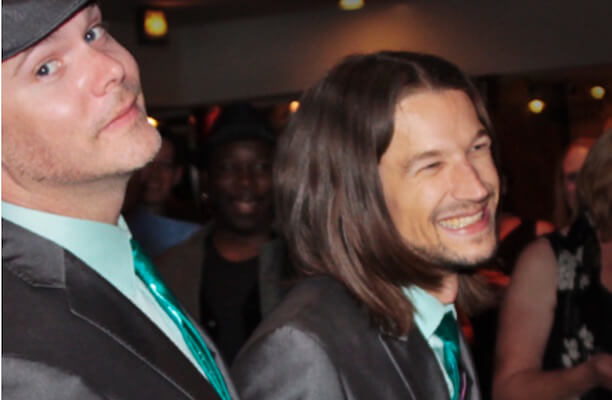The late Donald Zarda, a skydiving instructor whose estate will now have a chance to go before the Second Circuit Court of Appeals’ full bench with a sexual orientation discrimination suit brought after he was fired by Altitude Express. | FACEBOOK.COM
As the Second Circuit Court of Appeals was pondering three petitions asking for en banc consideration of whether Title VII of the 1964 Civil Rights Act can be interpreted to ban sexual orientation discrimination as a form of sex discrimination – one petition of which has since been accepted – a federal trial judge in Manhattan ruled that “in light of the evolving state of the law,” it would be “imprudent” for the court to grant a motion to dismiss a gay plaintiff’s sexual orientation discrimination claim.
Senior District Judge Alvin K. Hellerstein, appointed by Bill Clinton in 1998, issued his ruling in Philpott v. State University of New York on May 3, the day after the third en banc petition was filed.
An en banc hearing in the Second Circuit involves participation by all of its 11 active judges, plus any senior judges who participated in a three-judge panel decision being reheard. Appeals are normally heard by three-judge panels, which are bound by existing circuit precedents. Only an en banc panel – or the Supreme Court – can reconsider and reverse such precedents.
Title VII’s application at issue in all-hands review, while Manhattan district judge declines to apply precedent
In Simonton v. Runyon in 2000, the Second Circuit ruled that Title VII could not be interpreted to forbid sexual orientation discrimination. This holding was reiterated by a second panel in 2005, in Dawson v. Bumble & Bumble, and yet again this year on March 27 in Christiansen v. Omnicom Group.
However, the circuit’s chief judge, Robert Katzmann, who sat on the Christiansen panel, wrote a concurring opinion there, joined by one of the other judges, arguing the issue should be considered en banc in “an appropriate case.”
The circuit has now found that case – Zarda v. Altitude Express, in which New York skydiving instructor Donald Zarda, in a suit brought in 2010, alleged he was fired from his job because he was gay. Zarda’s claim, now litigated by his estate in the wake of his 2014 death, was rejected by a three-judge panel on April 18 and the estate filed for en banc review on May 2. The case will be heard by the full circuit on September 26.
Katzmann’s discussion in his Christiansen concurrence basically embraced arguments articulated by the Equal Employment Opportunity Commission in its 2015 decision holding that David Baldwin, a gay air traffic controller, could bring a sexual orientation discrimination claim under Title VII against the US Department of Transportation.
The first of the en banc petitions was filed on April 19 in Cargian v. Breitling USA, Inc., in which another Manhattan trial judge, George B. Daniels, dismissed a gay watch salesman’s Title VII sexual orientation discrimination claim based on the circuit precedents. Daniels ruled last September, and Frederick Cargian filed an appeal to the Second Circuit. When the Christiansen decision was issued on March 27, it became clear his appeal to a three-judge panel would be a waste of time and judicial resources, and the American Civil Liberties Union, representing Cargian in cooperation with attorney Janice Goodman and the New York Civil Liberties Union, decided to petition the circuit to take the case up directly en banc.
The second petition was filed on April 28 by Matthew Christiansen’s attorney, Susan Chana Lask. The three-judge panel in Christiansen’s case had refused to allow his suit to continue on a sexual orientation discrimination theory, but concluded it was possible he would be able to proceed under a gender stereotype theory, based on a 1989 Supreme Court ruling holding that discriminating against an employee because they fail to conform to gender stereotypes is evidence of discrimination because of sex.
The Christiansen trial judge had concluded that if the factual allegations suggest sexual orientation played a role in the discrimination suffered by the plaintiff, he would be not be allowed to proceed under Title VII, but that finding, the appeals panel noted, overlooked an important element of Title VII – an amendment adopted in 1991 providing that a plaintiff is entitled to judgment if sex is a “motivating factor” in his or her case, even if other factors contributed to the employer’s discriminatory conduct. Christiansen could prevail, the panel suggested, as long as he could show that gender stereotyping was a motivating factor in his mistreatment.
At first it appeared that Christiansen would not seek en banc review, despite Judge Katzmann’s concurring opinion, as the panel unanimously voted to send the case back to the district court for consideration as a gender stereotyping case. Lask was quoted in newspaper reports as preparing to proceed to trial on the stereotyping theory. The ACLU’s en banc petition changed the game plan, evidently, and was filed on April 28.
After a different Second Circuit panel rejected the sexual orientation discrimination claim by Donald Zarda’s estate, Gregory Antollino, an attorney for the estate’s executor filed the May 2 en banc petition, with Stephen Bergstein of Bergstein & Ullrich as co-counsel representing a co-executor.
The very next day, Hellerstein issued his ruling, allowing Jeffrey Philpott, the gay former vice president of student affairs at the State University of New York’s College of Optometry, to pursue his Title VII sexual orientation discrimination, hostile environment, and retaliation claims. Hellerstein rejected the defendant’s alternative argument that even if sexual orientation discrimination were covered by Title VII, Philpott’s factual allegations were insufficient to support his claims.
After briefly reviewing the relevant Second Circuit precedents, Hellerstein noted the defendant’s argument that the court must dismiss the sexual orientation claims, and also Philpott’s request to file an amended complaint focused on gender stereotyping.
“Neither relief is appropriate,” wrote the judge. “The law with respect to this legal question is clearly in a state of flux, and the Second Circuit, or perhaps the Supreme Court, may return to this question soon. In light of the evolving state of the law, dismissal of plaintiff’s Title VII claim is improper.”
Hellerstein then provided a summary of Judge Katzmann’s Christiansen concurrence, which he referred to more than once as a “majority concurrence” as it was signed by two of the three panel members.
Hellerstein also pointed to the Chicago-based Seventh Circuit Court of Appeals en banc decision in Hively v. Ivy Tech Community College, issued on April 4, in which “the Seventh Circuit became the first Court of Appeals to unequivocally hold that ‘discrimination on the basis of sexual orientation is a form of sex discrimination’ and therefore cognizable under Title VII.”
“Among other reasons,” wrote Hellerstein, “the Seventh Circuit made this ruling ‘to bring our law into conformity with the Supreme Court’s teachings.’ The Seventh Circuit was also compelled by ‘the common-sense reality that it is actually impossible to discriminate on the basis of sexual orientation without also discriminating on the basis of sex.’”
Hellerstein asserted that because Philpott “has stated a claim for sexual orientation discrimination, ‘common sense’ dictates that he has also stated a claim for gender stereotyping discrimination, which is cognizable under Title VII. The fact that plaintiff has framed his complaint in terms of sexual orientation discrimination and not gender stereotyping discrimination is immaterial. I decline to embrace an ‘illogical’ and artificial distinction between gender stereotyping discrimination and sexual orientation discrimination, and in so doing, I join several other courts throughout the country.”
The en banc panel hearing Zarda will include two senior judges – Robert Sack and Gerard Lynch – who sat on the three-judge panel in the case, in addition to the circuit’s 11 active judges. Of the 13 judges in total, nine were appointed by Democratic presidents – four by Bill Clinton and five by Barack Obama.


































